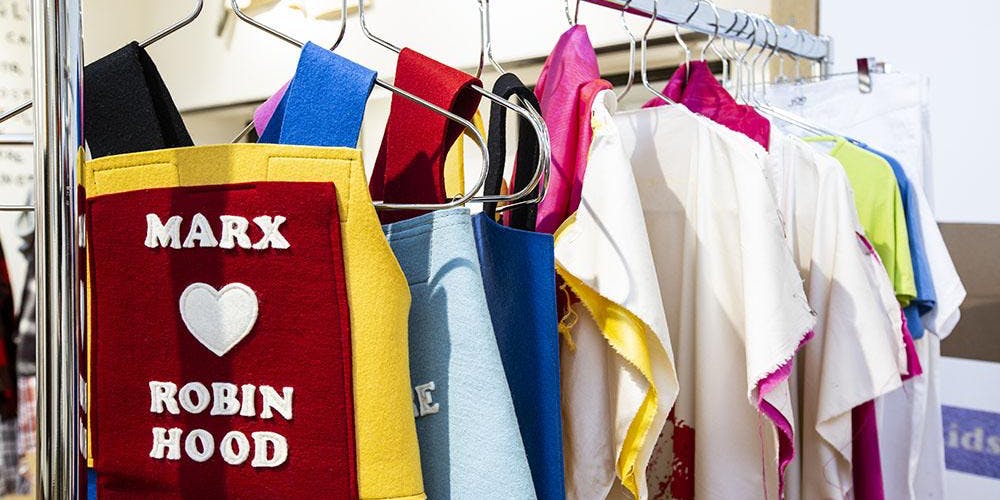By Pont C Nelson, Post-Grad Student Ambassador, MA Interior and Spatial Design at Chelsea College of Arts

“Marx has been a major point of orientation as i strive to conceptualise the world around me through the lens of historical materialism and his ethics. I make these artwork not only out of my inherently ludic nature, but also because of my unceasing belief in the fundamental democratic assumption that all people should be treated as equals.” – Rainer Ganahl
On Tuesday 20th November members of the Post-Grad community and alumni visited the ‘Comme des Marxists’ exhibition held at the Fashion space gallery, London College of Fashion. The event began with a tour of the exhibition where the members were greeted and introduced to the project by the curator Camilla Palestra. The exhibition explores the connection between industrial revolution, on-going class struggles, the notion of sustainability, tragedies such as the collapse of the Rana Plaza clothing in Bangladesh , the production and consumption of luxury goods, and both fine art and fashion.
The project challenges our understanding of the fashion system through a playful humour, yet thought-provoking approach. Sources of inspirations for the exhibition are as diverse as artists Kazimir Malevich, Blinky Palermo, Joseph Beuys, Richard Serra; designer Karl Lagerfeld; fashion houses Come des Garcons and Hermes.
The name ‘Comme des Marxists’ takes an immense influence from the French label ‘Comme des Garcons’ when Ganahl visited the boutique in New York and saw a felt collection that borrowed heavily from the Constructivist designs of the Russian artist Varvara Stepanova. He played with the brand’s logo and started to make drawings for a collection that also employed felt. He soon became interested in proposing his own designs by playing extensively with Soviet symbols of stars, hammer, sickle, as well as words like “class struggle” and “profit”.
I have noticed many intriguing design pieces from the collections, ranging from manipulated second-hand jackets with integrated market bag’s fabric from the ‘Karl Marx Speaks Chinese’ collection to the easy-to-wear poncho style garments marked with speech bubbles, reflecting the true reality of middle-class struggles such as “Can’t pay for school” or “Just lost my job” from the ‘Marx Middle Class squeeze’ series.
All of these pieces tackle different issues among our modern society through the means of fashion from a Marxist point of view. One thing they all have in common is the intention to convey messages about Marxism, the historical theory of materialism and anti-capitalism and to expose the effects it has on the economic, social and cultural system. It was fascinating to understand the connection between the theory of Marx and how much our society have been driven under capitalism in the past few decades.
The truth is, we as consumers are often unaware or intentionally neglected issues concerning sustainability. Whether that is child-labour, fast-fashion and overconsumption wastes, unethical sources of material in fashion or social impacts within our generation; all of which are the effects of capitalism. Ganahl have successfully illustrated these topics though garment designs, which is a tangible means of addressing messages to consumers.

The second part of the afternoon was a workshop focusing on developing a manifesto tackling topics of sustainability in fashion and the actions which could make a difference to society, where the PG members were divided into groups based on their subjects of interest. It was interesting to see how students from different courses interpreted the term sustainability and deal with the topic differently. We were first, asked to come up with problems within the industry then discussed about what actions could be implemented.
The topics were as wide as, anorexia and body image, consumerism and its effects on social, cultural, economic and environmental contexts, social media and negative impacts on consumption and unethical textile dyeing process. We were challenged to respond with approaches in which these actions could be taken on a personal or community level in order for change to really happen. I started to realise how much impact capitalism have on our society, from the way we purchase goods and commodities to the way we live our lives. We are often left with limited choices and options because of the way capitalist society is constructed and it is crucial that we as responsible consumers take serious actions about these issues.
The ‘Comme des Marxists’ exhibition is part of the year-long celebration of the Centre for Sustainable Fashion’s 10-years anniversary and LCF Arts Programme 2018 around sustainability heals at Arcade East. The works will be on display at the Fashion space gallery, London college of fashion, John Prince’s street until 19th January 2019.

